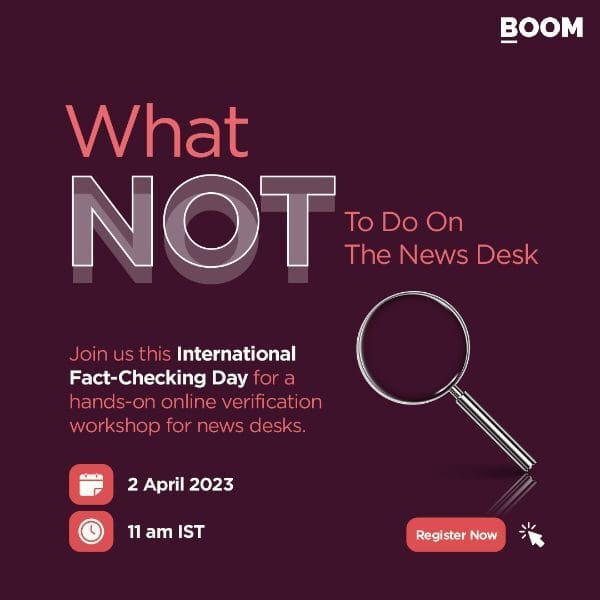- Verified By BOOM
- Posts
- Verified By BOOM 37
Verified By BOOM 37
🔥 What Does Early Heatwave Warning Mean For India?
Browser View | March 5, 2023 | Subscribe

Good morning. This week, I take you through different types of claims that we see on social media. Some facts-are checkable, others are not.
How do you navigate through them?
👋 I’m Divya. Lets begin.

🔖 Recently, I have come across several instances wherein social media users shared information without really claiming anything but it was more like an insinuation.
Basically, saying something without really saying it directly. Also, it's a matter of interpretation. When information is open to interpretation, two people can understand it differently which may/may not be in line with the intention of the social media user who originally shared the information.
Meanwhile, sometimes not every claim/ text/ message can be fact-checked. What do I mean by that?
Well, not everything comes under the domain of true or false. Certain things are gray areas which have to be handled as gray areas. You can probably do a context check or find out all the relevant information that there is regarding the claim but you cannot fact-check it.
Then there are another set of claims: conspiracy theories.
How do you verify/ fact-check a conspiracy theory? Let us know your thoughts by sending a mail to [email protected].
✅ Misinformation This Week
This week, BOOM published a total of 28 fact-checks. The most prevalent nature of claims is Political (25%), with International claims coming second at 21%.

Read our Twitter thread to know the detailed analysis by Debraj Sarkar. 👇
#Thread 🧵This week, BOOM published a total of 28 fact-checks. The most prevalent nature of claims is Political (25%), with International claims coming second at 21%. (1/n)
— BOOM Live (@boomlive_in)
8:29 AM • Mar 3, 2023

🌡️ An Early Heatwave Warning: What Does It Mean For India?
🔖 Are you also feeling the heat already?
Speaking to BOOM, AVM Sharma, president (Meteorology & Climate Change) of Skymet Weather, said that this year the heatwave has come early against the normal trend.
"We mostly recede the winters by February, but this time the shift has come early. Normally, the Indian Subcontinent experiences these waves in the pre-monsoon months, which are March, April, May and parts of June".
Read more on heatwaves in this explainer by BOOM's Hera Rizwan.
📑 What Is Hindusthan Samachar, Prasar Bharati's News Feed Source?
🔖 Meanwhile, reports emerged late last week saying that news agency Hindusthan Samachar would replace the Press Trust of India (PTI) as the official news feed source for Prasar Bharati, India's state-owned public broadcaster.
Here is all you need to know about Hindusthan Samachar being taken as Prasar Bharati's news feed source in this explainer by Sana Fazili.

How Did ‘Godman’ Nithyananda's Imaginitive Country Get Into An UN Meet?
🔖 A photo of a woman in saffron attire, covered in jewellery went viral on social media platforms last week. She called herself the “ambassador” of a country called Kailasa, who was attending a meet by the United Nations. But is Kailasa really a country? So, how can a country be formed? Read this report by Kaisar Andrabi to find out.

🔖 A cropped video of Volodymyr Zelenskyy saying that the United States will have to send their "sons and daughters" to war, went viral with a false claim that the Ukrainian president wants the US to send its troops to fight for Ukraine in the ongoing Russia-Ukraine war.
Read this fact-check by Anmol Alphonso.

🔖 Further, a photo of a green coloured cloth hanging inside a temple and Islamic holy number '786' written on it was shared on social media falsely claiming that the Waqf board had claimed the property of the Maa Chandi Devi temple present in Gunderdehi, Chhattisgarh. Read this fact-check by Runjay Kumar to know how he debunked the claim.

🅱️ Recommends
📖 This week's recommendation is: Filter Bubbles, Echo Chambers, and Online News Consumption by Seth Flaxman, Sharad Goel, Justin M. Rao.
This article explores how political polarisation is determined by online news consumption practices of everyday citizens in the US. The intent is to highlight the findings in light of two ideological camps that assert how the internet generally influences citizens looking for news content. On one side, it is asserted that there is greater exposure to conflicting information which helps democracy and the other side points to behavioural patterns of people only consuming things from sources they identify with (taking into consideration parameters of identity like ideological slant, state affiliation and so on).
📢 Free Workshop Alert
Join us this International Fact-Checking Day for a hands-on online verification workshop for news desks. The workshop will take you through the basics of fact-checking including verification of images, videos and text before reporting them. This and a lot more in the one-hour workshop specially curated for news desks.

↪️ Was this forwarded to you?
Verified By Boom is written by Divya Chandra, edited by Adrija Bose
and designed by H Shiva Roy Chowdhury.
If you have suggestions about this newsletter or want us to conduct workshops on specific topics, drop us a line at 👉 [email protected] and we will get back to you in a jiffy. Thanks for reading. See you next week.👋
🖤 Liked what you read? Give us a shoutout! 📢






↪️ Become A BOOM Member. Support Us!↪️ Stop.Verify.Share - Use Our Tipline: 7700906588↪️ Join Our Community of TruthSeekers

Copyright (C) " target="_blank">unsubscribe